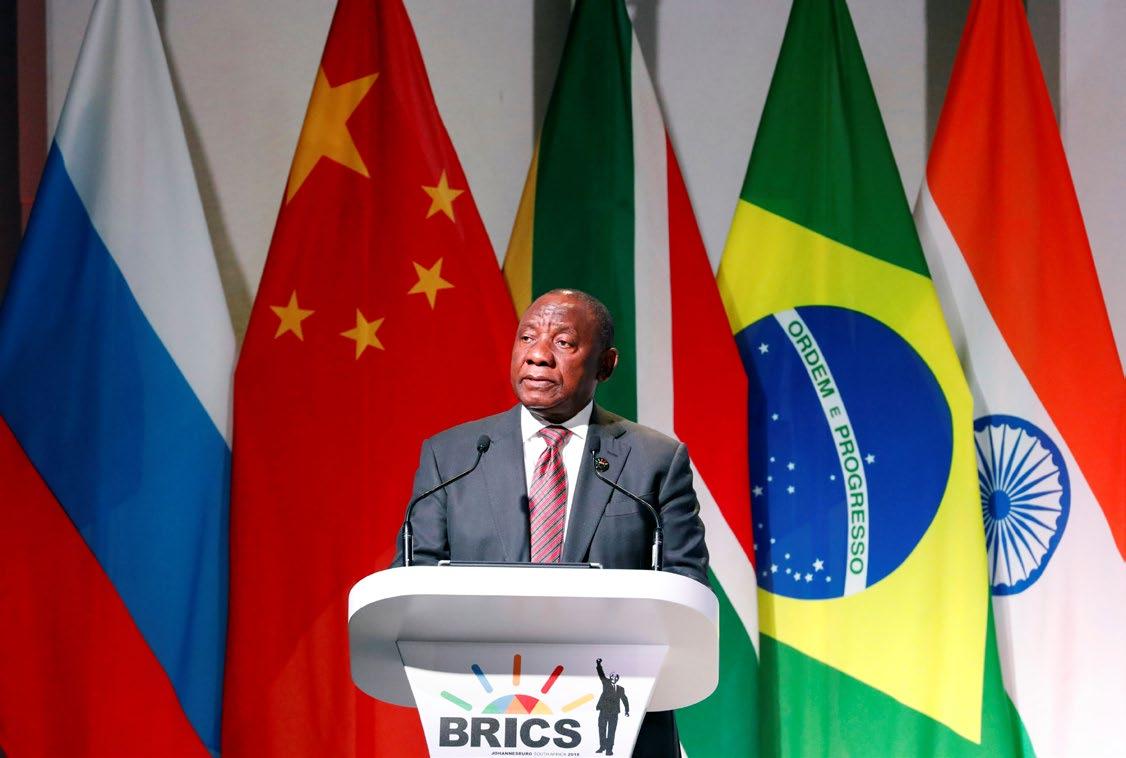
5 minute read
SA to advocate for ‘open and rules-based global governance, trade, financial and investment system’
South Africa will host more than 40 heads of state for the 15th BRICS Summit, which starts in Johannesburg today (tuesday), the largest gathering of global leaders since the advent of the Covid-19 pandemic.
On the agenda is the possible expansion of the bloc, with 22 countries, including Egypt, turkey, Indonesia and Argentina having applied to join BRICS to be part of the rise in the Global South, under the theme of “BRICS and Africa: Partnership for Mutually Accelerated Growth, Sustainable Development and Inclusive Multilateralism”.
The summit is aligned with the BRICS business forum, which not only provides an opportunity for the bloc’s countries and the private sector to gather, but is also an opportunity for the African sector and private sector from the Global South.
A large number of countries have converged on South Africa and the business sector will look at deepening economic interaction, trade opportunities and partnerships
BRICS leaders President Luiz Inacio Lula da Silva, Prime Minister Narendra Modi and President Xi Jinping will be in the country while Russia will be led by Foreign Minister Sergey Lavrov.
President Vladimir Putin of the Russian Federation will join the summit via video link.
South Africa’s overall trade with its BRICS partners has increased by an average growth of 10% between 2017 and 2021. BRICS now accounts for 21% of South Africa’s global trade in 2022, with trade with China accounting for about 15% of South Africa’s global trade with a total trade of R556 billion.
India accounts for 6% of the total trade, increasing from R140bn in 2021 to R225bn in 2022.
President Cyril Ramaphosa, addressing the nation on Sunday, said the country’s foreign policy is a matter that is vital to its progress as a nation.
He said the world has become more complex and fractured as it is increasingly polarised into competing camps with multilateralism being replaced by the actions of different power blocs, “all of which we trade with, invest with, and whose technology we use”.
“It is for this reason that South Africa continues to advocate for an open and rules-based global governance, trade, financial and investment system.
“It must be a system that does not depend on the exercise of power or unilateralism, but by the advancement of the interests of the peoples of the world. through stronger relations with other countries, manifested through investment and trade relations, we can grow our economy, create more opportunities for new businesses and create jobs.”
Ramaphosa said South Africa’s foreign policy aims to promote the country’s national interest based on the protection and promotion of national sovereignty and constitutional order.
He said it is also aimed to improve the wellbeing, safety and prosperity of citizens, and the achievement of a better Africa and world.
“the key pillars of our foreign policy include the promotion of human rights, peace and stability and the strengthening of trade and investment ties with other countries.
“The foreign policy stance we have taken since the advent of democracy has positioned South Africa as a reliable and influential partner on our continent and in the world.”
Ramaphosa said this has enabled the country to have friendly and valuable relations with countries around the world at political, diplomatic, trade, investment, sporting, social and many other levels.
“It is these principles that guide our participation in BRICS.
“Together, the members of BRICS – Brazil, Russia, India, China and South Africa – make up a quarter of the global economy, they account for a fifth of global trade and are home to more than 40% of the world’s population.
“BRICS as a formation plays an important role in the world due to its economic power, market potential, political influence and development co-operation.”
Ramaphosa said the value of BRICS extends beyond its sheer size.
“BRICS countries can collectively shape global dynamics; and acting together, have the potential to drive significant changes in the world economy and international relations.
“together, the BRICS members have used their collective voice to call for a world that is more equitable, balanced and governed by an inclusive system of global governance.”
He said South Africa’s BRICS membership has created positive opportunities for South Africa, enabling the country to have a strategic relationship with China.
“Based on the strategic relationship between South Africa and the People’s Republic of China, we will be signing several agreements during President Xi’s State visit.
“We have steadily strengthened trade and investment ties with other BRICS countries alongside collaboration in areas like development, skills, technology, security and innovation.”
One of the examples of how South Africa has benefited, said Ramaphosa, is the New Development Bank, which was established by the BRICS countries in 2015.
“Our country has been funded by the bank in several infrastructure projects to the value of R100 billion in sectors such as roads, water, transport and energy.
South Africa has always championed the interests of Africa within BRICS. to further advance the African development agenda, more than 30 heads of State and Government from across Africa will be attending the summit.”
“The key pillars of our foreign policy include the promotion of human rights, peace and stability and the strengthening of trade and investment ties with other countries .”







